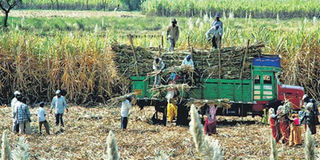Sugar Bill will stabilise the industry

What you need to know:
While reporting about Parliament’s request to the Executive to present the revised Sugar Bill, the story alleges that the zoning policy being proposed by government for inclusion in the Sugar Bill is intended for the sole purpose of protecting the large millers
I write in reference to the story, “Kadaga rejects government request on the Sugar Bill”, which appeared in the Daily Monitor of November 7. The story misrepresented some facts on the Sugar Bill hence the need for some things to be highlighted and corrected.
While reporting about Parliament’s request to the Executive to present the revised Sugar Bill, the story alleges that the zoning policy being proposed by government for inclusion in the Sugar Bill is intended for the sole purpose of protecting the large millers hence creating exploitative monopolies to the sugarcane outgrowers and further suffocate the new small scale producers (being derogatorily referred to in the news articles as parasite new comers) out of business.
Uganda Sugar Manufacturers Association (USMA) has provided logical and well-researched explanations for the need to effectively regulate the sugar industry so that a Sugar Act will regulate the operations of the sugar industry in Uganda to be sustainable and operate efficiently for the benefit of all the stake holders. Sugarcane production requires a stable environment and long-term planning due to the long period for sugarcane to mature as a plantation crop.
Having more than one sugar factory in the vicinity of another established factory creates unrealistic surge in demand for sugarcane, which in turn results in high prices of the available cane in a particular area. Besides, the climate of Uganda allows sugarcane growing all over the country.
The basic objective of regulating the sugar industry is for each factory to have a 25-km radius within which to develop their sugarcane and assist farmers in the latest technological changes so that it is a win-win situation for all stakeholders. It should, therefore, be clarified that the implementation of the 25-km radius is for establishment of sugar factories and not for sugarcane farmers as it is being wrongly perceived. Under the zoning policy, the sugarcane farmers will be free to supply any factory unless they are contractually bound to a particular factory in a given zone.
We have always maintained that establishing more sugar factories in close proximity to each other will not lead to increased sugar production. These new factories should be properly located in their own zones and develop their own cane. In the case of Uganda, up to 2014, sugar production was increasing every year to 438,000MT for the same year. When new factories came in and expanded their sugar capacities, sugar production started going down from 2015 to 2017 when only 365,452 metric tonnes were produced although with many factories in operation.
Due to high sugarcane prices experienced in 2016/2017, several farmers went into sugarcane planting and some of them did not register their plots with any miller. Two years down the road, the sugar industry is talking of availability of excess sugarcane whose harvest and milling was unplanned by the millers. The drop in sugar prices regionally and world over, has now resulted in a drop-in cane price and effectively less sugarcane planting.
Therefore, for long-term sustainable sugar industry and in the overall national economic interest, including those of farmers, workers, consumers and government revenues, we appeal to all stakeholders to note that the Sugar Bill 2016 should ensure effective regulation of sugar mills so that we can operate in a sustainable environment hence allowing the industry to grow and contribute effectively to the dream of our country of attaining the middle income status.
Wilber force Mubiru,
USMA


